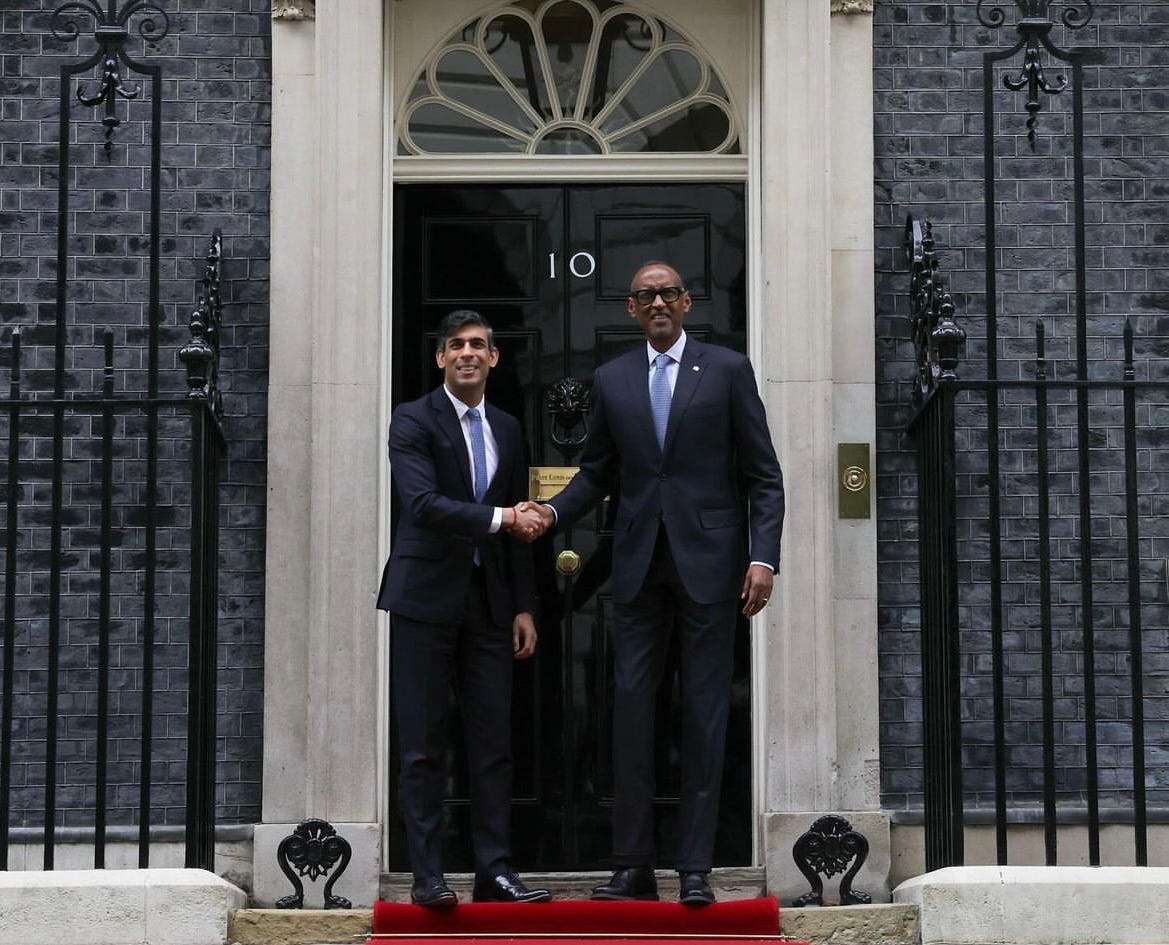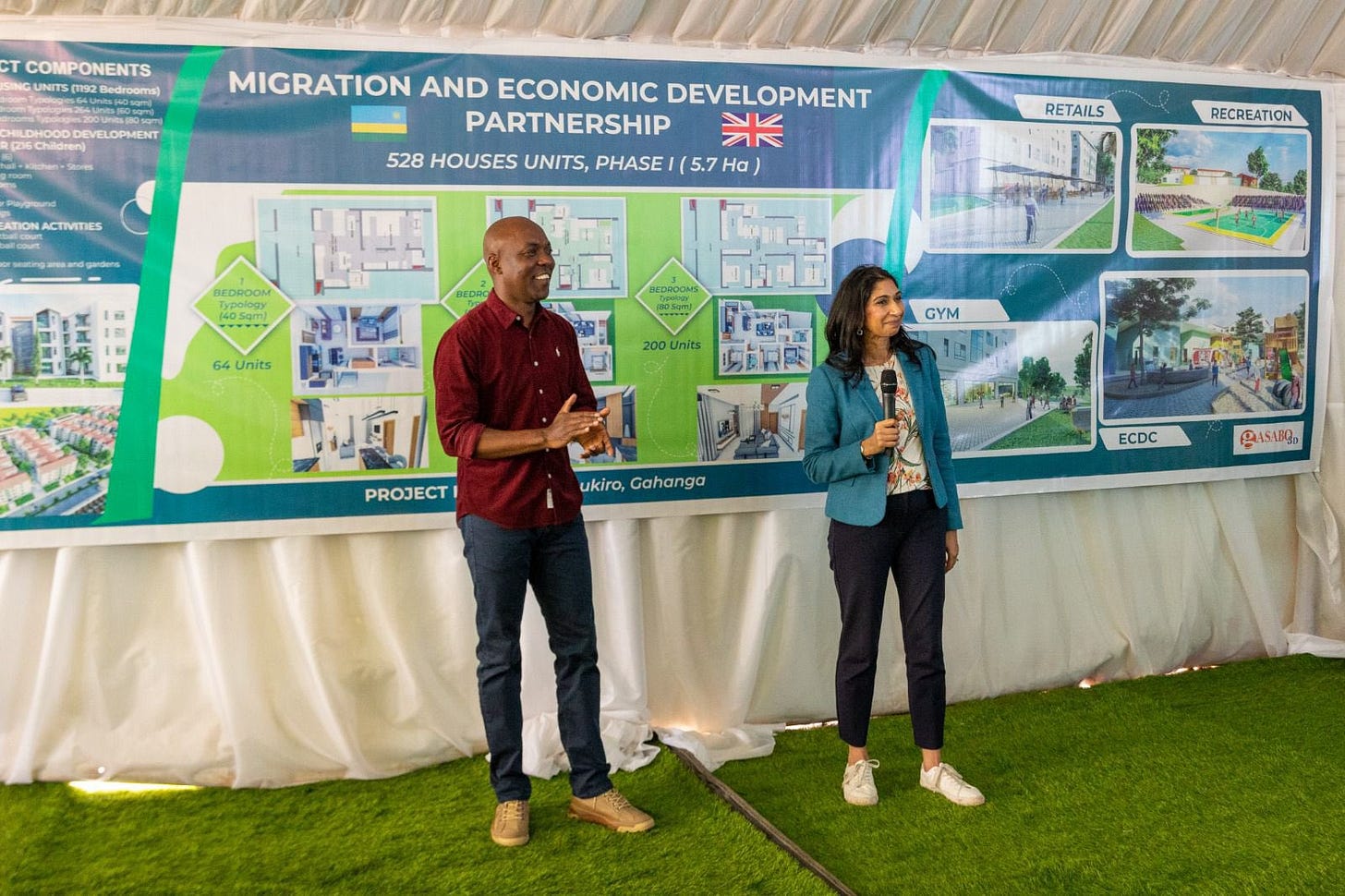Did Rwanda Sell Properties Earmarked for Failed UK Asylum Seekers?
The ping-pong of claims and counter-claims does raise a major issue of trust in the conduct of public affairs, and the truth of the matter is of the essence.
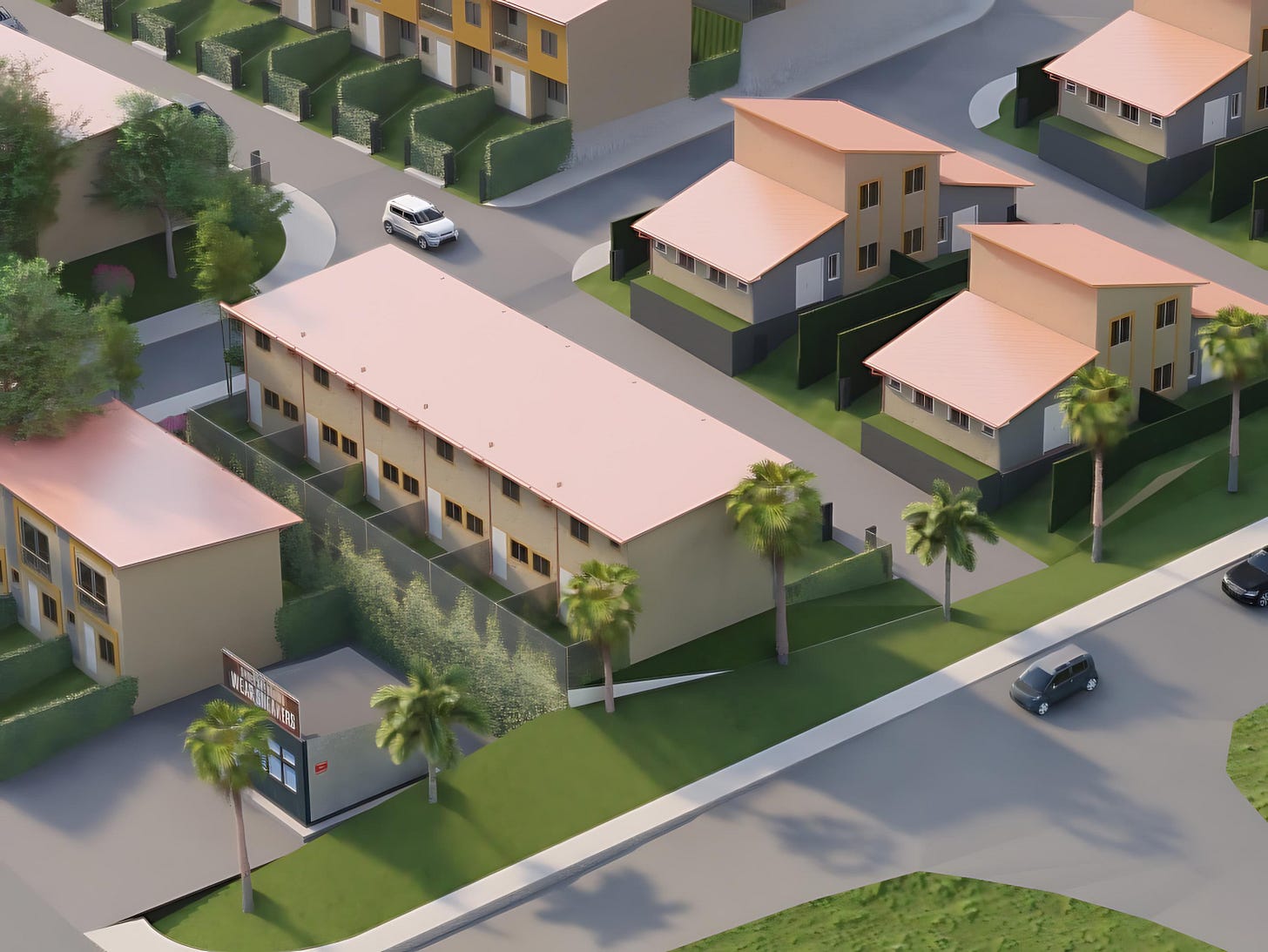
The UK’s controversial plan to deport illegal migrants to Rwanda has been one running plot with many twists, and with a host of sticky questions.
One such question is whether the Rwandans have sold off properties that were supposedly earmarked to house failed asylum seekers from the UK.
This—if true—would obviously qualify as a positive development for the outraged human rights groups, which are indignant at the idea of charter flights leaving Britain with loads of migrants bound for Kigali.
But as The African Gazette could establish, the available evidence suggests a case of a PR stunt that’s now been overtaken by the facts.
How so, exactly?
A proper answer to this question demands a close look at some key facts that fit together into a thread—one which stretches back to the 2023 visit in Rwanda of Suella Braverman, the former Home Secretary who has since been sacked by Prime Minister Rishi Sunak.
Kagame at Downing Street
In early April, Rwandan President Paul Kagame took a break from the events marking the 30th anniversary of the Tutsi genocide and flew out to Britain.
At Downing Street, he met Prime Minister Rishi Sunak to discuss a number of issues, including—of course—the highly controversial UK’s plan to deport illegal migrants to Rwanda.
At the time, the plan was tentatively recovering from its latest blow, after the UK Supreme Court ruled it unlawful. The revised bill that MPs would pass less than a couple of weeks later was yet to be voted. In other words, there was a great deal of uncertainty about the Rwanda Plan, when Kagame came over for that face-time with Sunak..
Yet, following the meeting at Downing Street, the PM’s office declared in a buoyant statement that “both leaders looked forward to flights departing to Rwanda in the spring.”
That was erratic, to say the least. But the outstanding hurdle in Parliament wasn’t the only reason why this public profusion of enthusiasm qualified as such—The display of confidence flew straight in the face of reports that were carried prominently in the columns of some British broadsheets.
The Claim
“Rwanda sells homes earmarked for migrants after deportation flight delays,” the right-leaning Daily Telegraph proclaimed on the very day Kagame and Sunak had their meeting.
Sure, Paul Kagame had planned many things as part of his UK visit—including a trip to North London for a Champions League match that was to pit his club, Arsenal, against Bayern Munich.
But the presidential sideshow appeared as somewhat of a distraction from something more substantial, and the Telegraph was not willing to go along—It was rather interested in probing Paul Kagame’s actual commitment to the Rwanda Plan.
As the paper reported, some homes on the Bwiza Riverside Estate, which were allegedly set aside for the prospective migrants to be deported from the UK, have been sold to locals.
The Bwiza Riverside Estate—key to this story—is a new housing estate in Rwanda’s capital Kigali.
Citing the Times as its source, the Telegraph said that almost 70% of the 163 affordable homes had been sold to “private people who want to live in them”.
If anything, this was embarrassing stuff for Prime Minister Rishi Sunak, who has staked a lot on the Rwanda Plan. But apparently, it was less so for Paul Kagame.
In fact, the Rwandan government saw no problem with the reported sales. As a chief government spokesman, Yolande Makolo, was quoted as saying, “none of the assigned housing estates were ever meant to be only for migrants.”
Clearly, there were two competing claims about the same story. Both cannot be accurate.
So, how did the confusion—deliberate or otherwise—come about? How did some apparently wishful thinking come to be passed as a fact?
Our Investigation
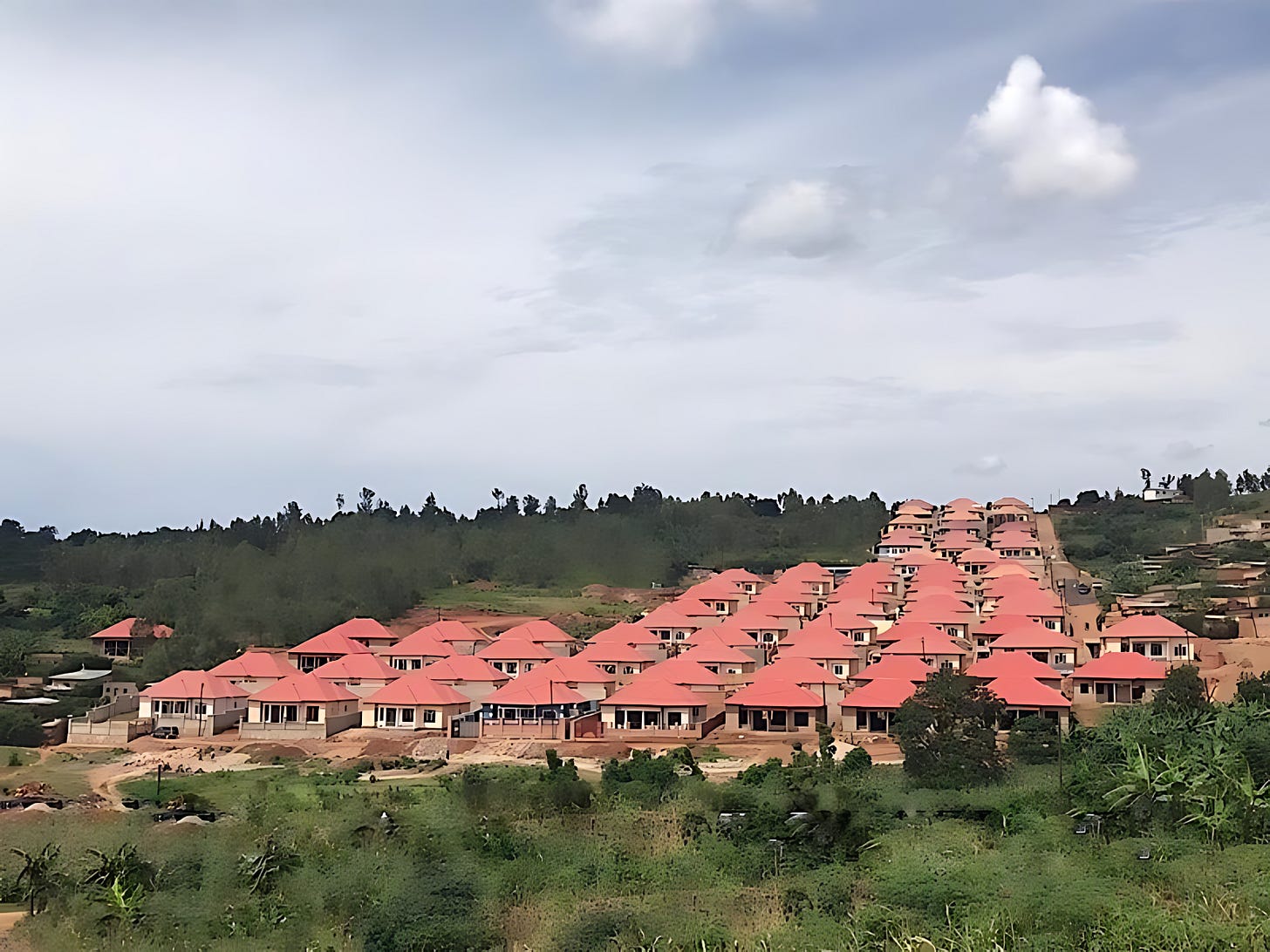
Within the grand scheme of things, the alleged sale of properties to private individuals—in the face of it, contrary to what the public was made to understand—wouldn’t be the most controversial aspect of the embattled Rwanda Plan.
But in principle, this ping-pong of claims and counter-claims does raise a major issue of trust in the way public affairs are conducted. The truth of the matter is of the essence.
In our investigation, we wanted to establish first that the quotes attributed to the Rwandan government weren’t made up, as the media scandals that’s beset the British press over the years suggest is possible.
So, we directly reached out to the Rwandan government for clarification. It took a few days of waiting before we finally got something back.
“It is simply not true that 70% of the houses [at the Bwiza Riverside Estate] are sold,” the deputy spokesman of the Rwandan Government, Alain Mukuralinda told the African Gazette.
He went on to say that British reporters have got the Bwiza River Estate confused with another site, the Gahanga Riverside City Estate, which he says is the focal point of the partnership with the UK government.
But even then, he added, Gahanga isn’t intended to be some exclusive quarters for asylum seekers.
“Gahanga is going to be used for both migrants and Rwandans,” Mukuralinda told us. “Construction on Gahanga is progressing well and we expect it to be completed on schedule.”
So, yes—the Rwandans are adamant that they are holding their end of the bargain. And except the unexpected mention of that Gahanga Estate, Alain Mukuralinda appeared to be consistent with his colleague Yolande Makolo, whom The Times interviewed.
At this point, if the Bwiza River Estate is established as never having been part of the deal with the UK, all the fuss about the reported sales of properties, readily confirmed by the property developers, becomes a non-issue.
But how could we possibly check that? When and how did the Bwiza Riverside Estate enter the picture?
Tale of Two Housing Estates
“It was an honour to lay the first bricks of the UK-funded Gahanga Housing project. This accommodation will support people to rebuild their lives in Rwanda and ensure they can have a prosperous future.”
—Suella Braverman
The UK-Rwanda Migration and Economic Partnership (the official and politically-correct designation of the deportation programme) first became a thing on 14 April 2022.
That day, former Home Secretary Priti Patel travelled to Rwanda and attended a ceremony to sign some paperwork alongside Rwanda’s Foreign Minister Vincent Biruta.
Addressing the importance of the business that had brought her to town, Patel said, “This will see some of those arriving illegally in the UK, such as those crossing the channel in dangerous small boats, relocated to Rwanda to resettle and rebuild their lives.”
Patel left Rwanda without any word said as to where exactly the illegal migrants would be accommodated. It was the very start of the whole process.
Fast forward to March 2023. A year later.
Priti Patel had lost her job as Home Secretary. Suella Braverman, after an initial stint in the role under the short-lived tenure of Liz Truss, was back again as Home Secretary, and was on a visit to Kigali.
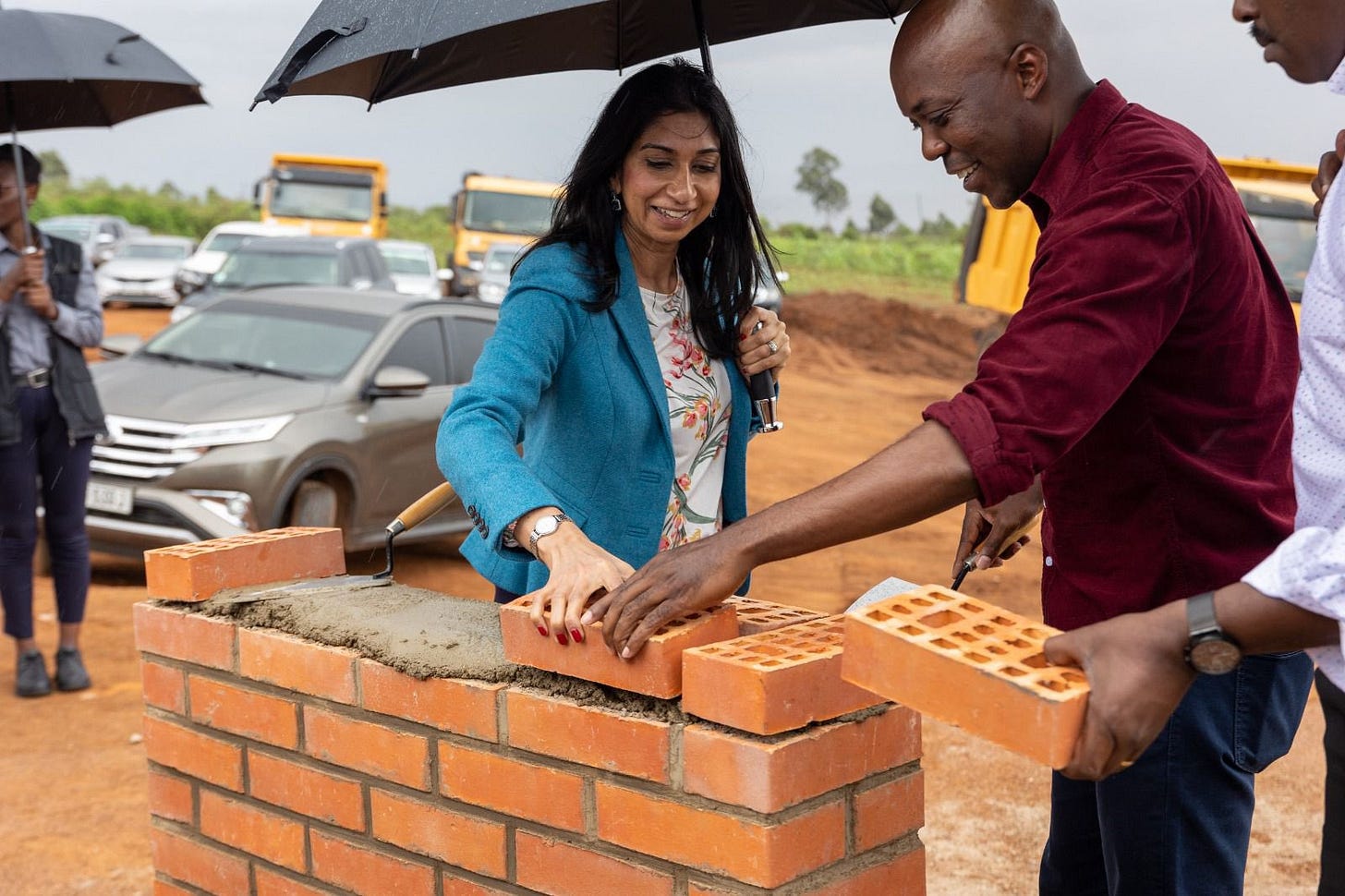
In her role as a king-maker in the Conservative leadership contest following the collapse of Liz Truss’s premiership, Braverman—known for her radical views on immigration—struck a deal with future PM Rishi Sunak.
Under the deal, she pledged her support to Sunak, in exchange for a stronger stance on immigration, reclaiming along the way the position she had to resign from, following a misuse of her official email.
Her visit to Kigali in March 2023 was part of her commitment to take seriously the illegal immigration issue. She had come to Rwanda to speed things up. And she would do what Priti Patel didn’t.
She filmed herself at work on the site of a housing development in Gahanga, on the outskirts of Kigali.
“It was an honour to lay the first bricks of the UK-funded Gahanga Housing project,” she later tweeted. “This accommodation will support people to rebuild their lives in Rwanda and ensure they can have a prosperous future.”
As the available evidence shows, the Conservative government—mired in successive leadership crises, and fending off legal challenges to the Rwanda Plan—appeared to suggest publicly that all was well and ready in Rwanda.
But in reality, it wasn’t until Braverman’s visit that the first bricks were laid for the UK-funded housing project. So, what about the Bwiza River Estate at the centre of the media reports?
Well, we have been able to establish that the Bwiza River Estate project is older (so to speak) than the UK-Rwanda deal. It certainly predates the tenure of Priti Patel as Home Secretary.
Inconvenient Timeline
In November 2020, the Rwandan Housing Authority contracted a building company—ADHI Rwanda Ltd—to complete work on the Bwiza Riverside Estate project.
It was part of a government’s wider Affordable Housing programme that was meant to ultimately deliver some 700,000 homes across the country.
And who was it for?
“The Bwiza Riverside affordable homes community project was designed primarily with first-time homeowners in mind,” the Rwandan Housing Authority says. “Qualifying buyers will choose from four distinct affordable home sizes and styles.”
So, Bwiza was not conceived as an estate earmarked for UK failed asylum seekers.
In fact, the estate was inaugurated and opened to buyers before Priti Patel on 14 April 2022 travelled to Rwanda for the signature of the controversial immigration deal.
“The houses are for Rwandans and 50% is already sold,” a sales adviser at ADHI-Rwanda told Open Democracy reporter Adam Bychawski. “So if you say it’s for refugees, I don’t think so.”
What, then, prompted those media reports?
The Braverman Effect
The Bwiza River Estate was absent of the debate surrounding the Rwanda Deal before Braverman’s stay in Kigali. It only came to the media’s attention as a result of one of two major things the former Home Secretary did when she was in Rwanda.
Before laying the first bricks of the UK-funded Gahanga Housing project outside the capital Kigali, Braverman was given a tour of the Bwiza Riverside Estate, certainly for her to have an idea of what Gahanga might look like when the construction work has been completed.
As a possible PR stunt—amid the unabated criticism that conditions are not good enough in Rwanda for migrants to be deported there—Braverman took pictures of herself within the estate and posted them on Twitter.
The note that accompanied the photos was couched in loose language, stating: “I visited Bwiza Riverside Estate today to see new homes that will be available to accommodate those relocated from the UK as well as Rwandans.”
The suggestion to the British public back home was that the plan was more advanced than the rather fresh foundation in Gahanga might indicate.
And in a film promoting her visit (a film that seemed to address what she called the “completely false narrative peddled by critics who want to scrap the deal”), Braverman observes: “These houses are really beautiful—great quality, really welcoming—and I really like your interior designer.”
And this is what first prompted reporters such as Adam Bychawski to start asking questions about the Bwiza Riverside Estate, with a renewed scrutiny from the broadsheets when Kagame came to London for his meeting with Rishi Sunak.
Our verdict
On the balance of the available evidence, the Bwiza Riverside Estate predates the UK-Rwanda deal, and it was not planned for failed asylum seekers from the UK.
The UK-funded housing project in Gahanga is located on a different site outside the capital Kigali, and construction there only began when Suella Braverman laid the first bricks in March 2023.
Yes, it is clear and uncontested that developers at the Bwiza Riverside Estate have sold properties to private Rwandans, but it's within the purview of the Rwandan government's Affordable Accommodation project, which is unrelated to the UK-Rwanda deal.
The misattribution of the Bwiza Riverside Estate can therefore be traced back to Suella Braverman's visit to Kigali. Her visit—a public relations exercise—aimed to convince sceptics that the Rwandan deal was both viable and on track.
However, when the truth could no longer be contained, it seemed convenient for the Conservatives to tacitly shift blame, ironically using the tarnished reputation of the Kagame regime as a smokescreen.
This regime, accused by rights groups of far more serious transgressions than just failing to fulfil a housing agreement, provided a perfect shield for the Conservatives.
In the end, the British media misdirected their scrutiny at the Bwiza Risverside Estate developers, who found themselves unduly taking some flak for selling homes intended for purposes other than housing asylum seekers.
Our conclusion: The UK-funded housing project is still under construction in Gahanga. The Bwiza Riverside Estate is unrelated to the UK-Rwanda deal.




